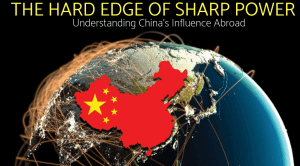China has launched the Global Civilization Initiative (GCI) — the last of a trio of Xi Jinping’s ideological frameworks — as being central to “cultivating the garden of world civilization,” or “Xivilization” as state media have termed it, Nikkei Asia reports:
“Countries need to keep an open mind in appreciating the perceptions of values by different civilizations and refrain from imposing their own values or models on others and from stoking ideological confrontation,” he told senior international political figures . ….. Xi’s initiative advocates for “common aspirations” of humanity, pitching a message that says, “Join our club, we won’t tell you what to do — unlike the West.” But scholars say collegiality will come at the expense of human rights protections…..
Should Western nations continue to frame the competing agendas as “autocracy versus democracy” that could help China’s cause, some analysts warn (Malaysian Prime Minister Anwar Ibrahim remains the only national leader to publicly support the GCI.)
The appeal of the GCI is enabled by its ambiguity, notes analyst R. Evan Ellis. Xi’s address presenting it spoke of “common aspirations” (not rights) of humanity of “peace, development, equity, justice, democracy and freedom.” At the same time, the GCI advocates against a world in which those concepts can have meaning through united efforts to call out and collectively act against those who violate them, he writes for The Diplomat. Under the GCI, perceptions of such “common aspirations” are “relative” and thus countries must “refrain from imposing their own values or models on others.”
In Southeast Asia, “At the political level there is a lot of alignment actually with the Chinese,” said Hoang Thi Ha, senior fellow at the Singapore-based ISEAS-Yusof Ishak Institute. “The idea of ‘Don’t just use values such as liberal Western values to dictate your foreign policy with us'” carries weight in some capitals, Hoang said.
 Authoritarian regimes’ “negative propaganda” spreads derogatory information defaming democratic rivals, but it does not necessarily improve regime support, notes Rex Weiye Deng of the Washington University in St. Louis. By analyzing over 800,000 Weibo posts from Chinese state-affiliated media, he demonstrates that exposure to such propaganda induces fear and significantly lowers evaluations of democracy and democratic reform. But it does not significantly improve evaluations of the domestic regime.
Authoritarian regimes’ “negative propaganda” spreads derogatory information defaming democratic rivals, but it does not necessarily improve regime support, notes Rex Weiye Deng of the Washington University in St. Louis. By analyzing over 800,000 Weibo posts from Chinese state-affiliated media, he demonstrates that exposure to such propaganda induces fear and significantly lowers evaluations of democracy and democratic reform. But it does not significantly improve evaluations of the domestic regime.
Beijing “believes that the People’s Republic of China must dominate and shape international institutions, standards and values in order to advance both its domestic and global agenda,” says an internal U.S. State Department document prepared earlier this year that focuses on China’s role at the United Nations and other international organizations, PBS reports.
 “It views the established rules and norms in the U.N. system and other international organizations as privileging Westerns countries, supporting liberal democratic principles, and posing a threat to its monopoly on domestic political power and assertive global ambitions,” said the document, which is marked “SBU,” which means “sensitive but unclassified” and was obtained by The Associated Press.
“It views the established rules and norms in the U.N. system and other international organizations as privileging Westerns countries, supporting liberal democratic principles, and posing a threat to its monopoly on domestic political power and assertive global ambitions,” said the document, which is marked “SBU,” which means “sensitive but unclassified” and was obtained by The Associated Press.
The document accuses China of having “undertaken a systematic campaign to subvert existing principles and standards, promote authoritarian ideology and policy (and) reprioritize economic development over human rights and democratic governance.”
In addition, it says China is working “to undermine or reshape international law and standards, institutions, and values to legitimize its own development and governance models, including related to human rights (and) using its economic and political influence to compromise institutions’ transparency, effectiveness, independence and alignment with foundational norms and values.”
From one perspective, the roots of authoritarian resilience in China might seem obvious, the University of Toronto’s Lucan Ahmad Way observes. China is a global military and economic power with a GDP more than 43 times as large as it was in 1978. Within a generation, Chinese living standards have risen dramatically, giving families access to consumer goods they could not have imagined just a few decades ago. Even with recent COVID-19 missteps and slower growth, many Chinese citizens have clear reasons to support the one-party state, he writes for Foreign Affairs.
 Yet such remarkable economic achievements provide an incomplete explanation for the regime’s durability, adds Way, a co-author, with Steven Levitsky, of Revolution and Dictatorship: The Violent Origins of Durable Authoritarianism:
Yet such remarkable economic achievements provide an incomplete explanation for the regime’s durability, adds Way, a co-author, with Steven Levitsky, of Revolution and Dictatorship: The Violent Origins of Durable Authoritarianism:
- For one thing, China’s extraordinary economic performance was only possible because the Chinese Communist Party (CCP) had earlier managed to unify the country….. Before it could become an economic and military powerhouse, China first had to create a modern, unified state.
- Second, the kind of spectacular economic development witnessed in China can be a double-edged sword for dictators trying to maintain a tight authoritarian grip. …This pattern would seem to spell trouble for the leadership of the CCP. By bringing millions out of poverty and creating a large middle class and influential business leaders, economic development in China has the potential to generate alternative centers of power that can fuel strong demands for political change. …But the Chinese regime’s origins in violent social revolution have allowed it to overcome a history of state failure, as well as the unintended consequences of economic change.
The CCP’s long and violent struggle for power between 1927 and 1949 produced the unified state necessary for rapid growth but also ensured that economic development would not generate a strong civil society, notes Way, a Journal of Democracy contributor.

National Endowment for Democracy (NED)
At first glance, the GCI may appear to be simply the latest iteration of what the National Endowment for Democracy’s International Forum calls China’s sharp power, but…..
Compared to how China has acted in the past, “It’s more sophisticated. It’s more strategic, more long-term oriented,” said Moritz Rudolf, a research fellow at Yale Law School’s Paul Tsai China Center.
“It’s a vision that China’s putting out on the table, while Western countries are currently in a sort of an identity crisis, figuring out how to deal with a lot of challenges … in a complex world. And then China just has an authoritarian answer to this.”
On a recent Forum podcast, Journal of Democracy author and Professor at Australia’s Swinburne University of Technology John Fitzgerald, Hong Kong native and Advisor at Central Asia’s OSCE Academy Niva Yau, and CEO of Taiwan’s Doublethink Lab TtCat discussed how their societies have leveraged expertise on China to address democratic vulnerabilities, and how others might be able to do the same. Christopher Walker, NED vice president for studies and analysis, and Kevin Sheives, deputy director at the International Forum for Democratic Studies, co-hosted the conversations.
Instead of taking sides in the old debate over whether non-democracies like China’s are on the verge of collapse or have instead found ways of maintaining their power indefinitely, Manfred Elfstrom’s book, Workers and Change in China: Resistance, Repression, Responsiveness (below) explores the daily evolution of autocratic rule. While providing a uniquely comprehensive picture of change in China, this important study proposes a new model of bottom-up change within authoritarian systems more generally.







